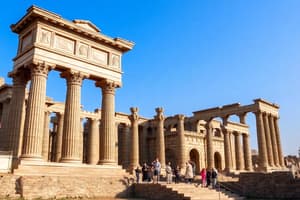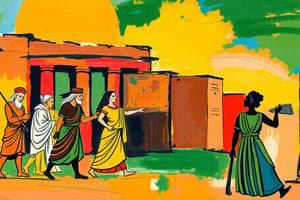Podcast
Questions and Answers
What was a significant consequence of the Neolithic Revolution?
What was a significant consequence of the Neolithic Revolution?
The transition to agriculture led to the development of settled communities and the rise of civilizations.
How did classical antiquity contribute to Western philosophy?
How did classical antiquity contribute to Western philosophy?
Ancient Greece and Rome saw significant philosophical achievements that laid the groundwork for Western thought.
What characterized the Middle Ages in Europe?
What characterized the Middle Ages in Europe?
The Middle Ages were marked by feudalism, the rise of Christianity, and significant cultural exchange.
Which events significantly transformed political landscapes during the 18th century?
Which events significantly transformed political landscapes during the 18th century?
What was one major influence of the Cold War on global politics?
What was one major influence of the Cold War on global politics?
What role do primary and secondary sources play in historical research?
What role do primary and secondary sources play in historical research?
How did the Renaissance connect to classical traditions?
How did the Renaissance connect to classical traditions?
Why is understanding different historical perspectives important?
Why is understanding different historical perspectives important?
What key factors should historians consider in their analysis?
What key factors should historians consider in their analysis?
Flashcards
Prehistory
Prehistory
The period before written records, characterized by hunter-gatherer societies and the development of early tools.
Neolithic Revolution
Neolithic Revolution
A significant shift around 10,000 BCE, marked by the adoption of agriculture, leading to the development of settled communities and civilizations.
Ancient Civilizations
Ancient Civilizations
Civilizations that emerged in ancient times, characterized by advancements in writing, governance, and technology, including Mesopotamia, Egypt, the Indus Valley, and China.
Classical Antiquity
Classical Antiquity
Signup and view all the flashcards
Middle Ages
Middle Ages
Signup and view all the flashcards
Renaissance
Renaissance
Signup and view all the flashcards
Age of Exploration
Age of Exploration
Signup and view all the flashcards
Modern History
Modern History
Signup and view all the flashcards
Historical Perspectives
Historical Perspectives
Signup and view all the flashcards
Historical Methods
Historical Methods
Signup and view all the flashcards
Study Notes
Historical Periods and Eras
- Human history is vast and complex, spanning millions of years.
- Prehistory encompasses the period before written records, marked by hunter-gatherer societies and the development of early tools.
- The Neolithic Revolution, starting around 10,000 BCE, involved the transition to agriculture, leading to settled communities and the rise of civilizations.
- Ancient civilizations, such as Mesopotamia, Egypt, the Indus Valley, and China, emerged, characterized by advancements in writing, governance, and technology.
- Classical antiquity, encompassing ancient Greece and Rome, saw significant philosophical, political, and artistic achievements.
- The Middle Ages, or Medieval Period, followed, characterized by feudalism, the rise of Christianity, and significant cultural exchange.
- The Renaissance witnessed a flourishing of art, science, and literature in Europe, connecting to classical traditions.
- The Age of Exploration and the subsequent colonial periods profoundly shaped global interactions and power dynamics.
- Modern history includes major global conflicts, technological advancements, and the rise of new political ideologies.
Key Historical Figures and Events
- Important figures like Genghis Khan, Alexander the Great, and Julius Caesar significantly impacted world history.
- The American and French Revolutions led to substantial political and social transformations.
- World Wars I and II reshaped the global political landscape, leading to the formation of international organizations.
- The Cold War, a period of geopolitical tension and proxy conflicts between the United States and the Soviet Union, profoundly influenced global events.
Historical Perspectives
- Understanding history requires a nuanced approach, examining various perspectives and recognizing different interpretations.
- Historical analysis should consider political, social, economic, and cultural factors in shaping events.
- Different historical narratives may exist, depending on the perspective of the historian or the group being studied.
- Historical study is crucial for understanding contemporary issues.
Historical Methods
- Historians utilize primary and secondary sources—documents, artifacts, and accounts—to reconstruct past events.
- Critical evaluation of sources is essential to identify bias and understand historical context.
- Historians engage in rigorous research and interpretation to present historical narratives.
- Historical analysis involves contextualizing events within their specific time and place.
Different Historical Categories
- World History encompasses the entire planet, including interactions between cultures and civilizations.
- National History focuses on the particular history of a specific nation.
- Social History examines social structures, customs, and everyday life within a society.
- Intellectual History analyzes the development of ideas and thought throughout time.
- Cultural History explores the diverse cultural expressions and beliefs in human societies.
- Economic History investigates the evolution of economic systems and practices during different periods.
Studying That Suits You
Use AI to generate personalized quizzes and flashcards to suit your learning preferences.




